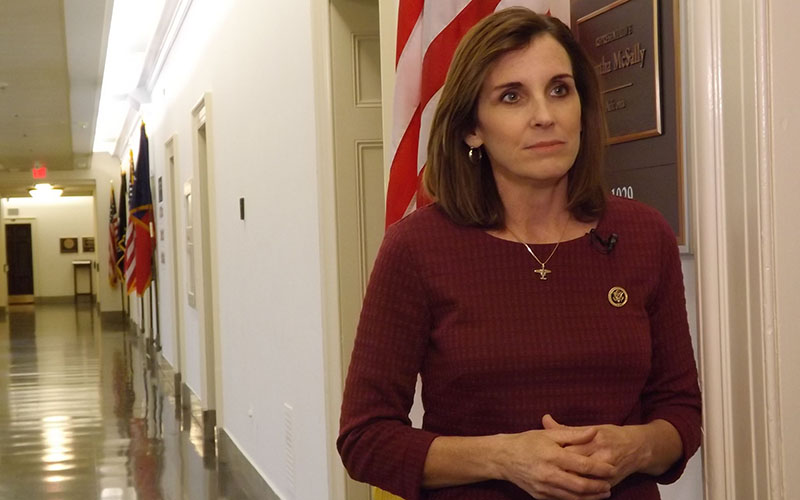
After barely losing the 2nd District seat in Congress four years ago, then barely winning it two years ago, freshman Rep. Martha McSally, R-Tucson, has raised more than $3.2 million for her re-election bid this year. (Photo by Madison Alder/Cronkite News)
WASHINGTON – Rep. Martha McSally’s aggressive fundraising gives her an edge over her competitors in the 2nd District House race, say experts, but they caution that the district will likely still be competitive come November.
The first-term Tucson Republican raised more than $3.2 million last year, topping all but a handful of House members, and had $1.9 million on hand at the end of the year, according to the latest Federal Election Commission filings.
While $3 million is a lot for challengers to overcome, analysts say other factors, such as the eventual GOP presidential nominee and outside funding, could have a large effect in the district, which is almost evenly split between Republican, Democratic and independent voters.
2nd District dollars:
Funds raised by candidates in Arizona’s 2nd Congressional District in 2015, and cash on hand at the end of the year:
* incumbent
“An incumbent sitting there with a couple million dollars is a pretty tall hurdle,” said Nathan Gonzales, editor of the Rothenberg and Gonzales Political Report, before adding that, “by the numbers, the district is competitive.”
Those numbers have been borne out in the last two elections. McSally lost to Democratic Rep. Ron Barber by 2,454 votes out of 292,279 cast in 2012, then came back to beat him two years later by a razor-thin margin of 161 votes out of 219,351.
“The Democrats would like to challenge McSally,” Gonzales said. “I think some Democrats still consider it to be (former Democratic Rep.) Gabby Giffords’ seat. There’s an emotional connection to the district. But the congresswoman has proven to be a phenomenal fundraiser.”
That has not deterred McSally’s Democratic challengers.
“We’re confident that we’ll have all the resources we need to run an effective, aggressive campaign against Martha McSally this November,” Keith Rosendahl, the campaign manager for former state Rep. Victoria Steele, D-Tucson, said in an email.
Steele raised $99,817 in 2015 and had $43,867 on hand on Dec. 31, according to the FEC. Rosendahl said recent polling commissioned by the campaign showed Steele to be McSally’s strongest Democratic challenger.
But the other Democrat in the race, Matt Heinz, has proven to be a better fundraiser so far, reporting raising $407,397 last year with $305,733 cash on hand at the end of the year. That is “right on our schedule,” said Bill Scheel, of the Heinz campaign.
“Obviously, McSally has raised a lot, she’s also spent a lot to raise that money,” Scheel said. “She has one of the highest burn rates of any candidate in the entire country.
“As this race takes shape, as Dr. Heinz’s campaign becomes higher profile, we’re going to end up being very competitive in the fundraising field,” Scheel said. “And we’re going to have all the fundraising we need to compete in November.”
McSally’s campaign said it is girding for that fight.
“We take no election for granted and will continue to work hard through Election Day, but it’s clear voters are happy with the job Martha’s doing, and all signs point to her re-election in November,” said Weston McKee, McSally’s campaign manager, in an email.
Gonzales said McSally has likely scared off others from entering the race, by building a “tremendous financial cushion” that would be strong in any district, including those in New York and California that typically draw large campaign donations. But he said she hasn’t clinched the seat yet, with other factors likely to weigh in.
The presidential race will impact congressional races across the country, Gonzales said, adding that McSally’s chances could be hurt if Republicans make “wild card” real estate mogul Donald Trump or conservative Sen. Ted Cruz, R-Texas, their nominee.
Brian Murray, a political consultant who supports McSally, was less hesitant, describing her as a “fundraising animal.”
“I think she’s going to run away with it,” Murray said. “I don’t see any way that she’s vulnerable at all.”
But Democratic consultant Rodd McLeod said the historically tough district won’t be so easily won.
“Because of the way this district is drawn, it’s super competitive so she’s definitely beatable,” Rodd said.
In the closely divided district, Rodd said McSally’s voting record will leave her vulnerable, pointing to her vote to defund Planned Parenthood as an example.
While she has raised a lot, Rodd said McSally has also spent a lot on fundraising and not enough on talking with voters. He said outside spending from liberal and conservative groups will have a major impact on the race.
Gonzales agreed that outside funding, from the Democratic Congressional Campaign Committee or other national groups, could affect the race, but he said McSally’s fundraising may have given them pause.
“It’s not an absolute lock that McSally’s going in,” Gonzales said. “There are other outside forces but she’s in a strong position and there isn’t a lot a lot of enthusiasm on the Democratic (fundraising) side.”